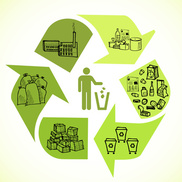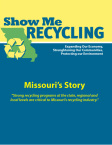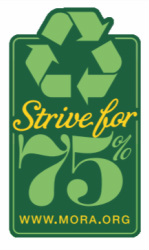Business waste solutions
MORA can help business and industry find effective solutions to materials management at all parts of the recycling cycle. Become a MORA member today and take advantage of the expertise and resources that we offer.
|
Recycling makes economic sense.If you are paying to dispose of recyclables in the landfill, you are paying too much! Many companies have found that once they separated out the recyclables they were able to sell materials that they used to pay to haul away! In addition to the new income, they were able to significantly reduce all the costs associated with landfill waste disposal - pick up fees, container charges, tonnage fees, and even labor charges for moving those materials around.
The less you throw away, the less you have to pay. |
A free Guide to Workplace Composting to help organizations develop workplace composting programs that support sustainability, waste reduction and zero waste initiatives created by Kimberly-Clark Professional, the US Composting Council (USCC) and Keep America Beautiful.
The guide provides step-by-step instructions and resources to help office buildings, manufacturing facilities, hotels, hospitals, universities and other workplaces divert organic matter - such as food scraps, used paper towels, coffee grounds and coffee filters - from landfills through composting. Composting is a landfill-free way of using decomposed organic materials to fertilize and condition soil. Compost also can reduce erosion, improve drought tolerance and help reduce the generation of greenhouse gases.
Food waste is the single largest component of disposed municipal solid waste and accounts for a significant portion of U.S. methane emissions, and landfills are the third largest source of methane in the United States. In September 2015, the United States Department of Agriculture (USDA) and Environmental Protection Agency (EPA) announced the country's first-ever national food waste reduction goal, calling for a 50 percent reduction by 2030. A number of states, including California, Massachusetts, Vermont and Connecticut, have initiated bans on landfill disposal of food waste from large commercial food waste generators.
For Keep America Beautiful, which has a Recycling@Work initiative to support workplace efforts to reduce waste and improve recycling, the collaboration resulted in "a great resource for those workplaces that are ready to add organics to their recycling programs," said Brenda Pulley, the organization's senior vice president for recycling.
"Composting is the natural, next step for implementing a 'reduce, reuse, recycle' strategy to give our garbage another life. We want to make it easy for workplaces to implement an effective program, which is why it's so important to support them with the right tools and resources," added Pulley.
To obtain a copy of "A Guide to Workplace Composting," visit http://compostingcouncil.org/workplace-composting.
The guide provides step-by-step instructions and resources to help office buildings, manufacturing facilities, hotels, hospitals, universities and other workplaces divert organic matter - such as food scraps, used paper towels, coffee grounds and coffee filters - from landfills through composting. Composting is a landfill-free way of using decomposed organic materials to fertilize and condition soil. Compost also can reduce erosion, improve drought tolerance and help reduce the generation of greenhouse gases.
Food waste is the single largest component of disposed municipal solid waste and accounts for a significant portion of U.S. methane emissions, and landfills are the third largest source of methane in the United States. In September 2015, the United States Department of Agriculture (USDA) and Environmental Protection Agency (EPA) announced the country's first-ever national food waste reduction goal, calling for a 50 percent reduction by 2030. A number of states, including California, Massachusetts, Vermont and Connecticut, have initiated bans on landfill disposal of food waste from large commercial food waste generators.
For Keep America Beautiful, which has a Recycling@Work initiative to support workplace efforts to reduce waste and improve recycling, the collaboration resulted in "a great resource for those workplaces that are ready to add organics to their recycling programs," said Brenda Pulley, the organization's senior vice president for recycling.
"Composting is the natural, next step for implementing a 'reduce, reuse, recycle' strategy to give our garbage another life. We want to make it easy for workplaces to implement an effective program, which is why it's so important to support them with the right tools and resources," added Pulley.
To obtain a copy of "A Guide to Workplace Composting," visit http://compostingcouncil.org/workplace-composting.
Recycling@Work - A Keep America Beautiful Program
Check out KAB's toolkit for starting your own recycling program at the office. Full of facts and ways to save money, KAB has the tools you need to reduce your waste and help your office's bottom line. Find it here.
"It’s estimated that nationally the commercial sector generates between 30% and 70% of a community’s municipal solid waste. Step up efforts to get businesses to first reduce and then recycle what they generate.
Boosting efforts to tackle commercial waste is a top priority for cities and businesses that want to cut costs, limit waste entering the landfill, and improve the environment. Plus customers notice."
"It’s estimated that nationally the commercial sector generates between 30% and 70% of a community’s municipal solid waste. Step up efforts to get businesses to first reduce and then recycle what they generate.
Boosting efforts to tackle commercial waste is a top priority for cities and businesses that want to cut costs, limit waste entering the landfill, and improve the environment. Plus customers notice."

